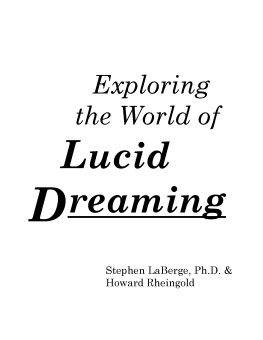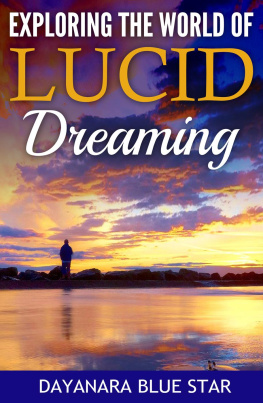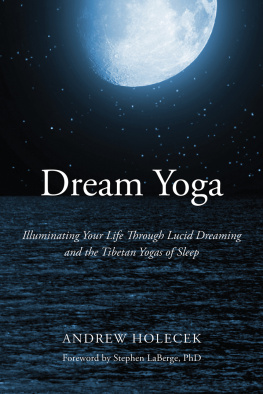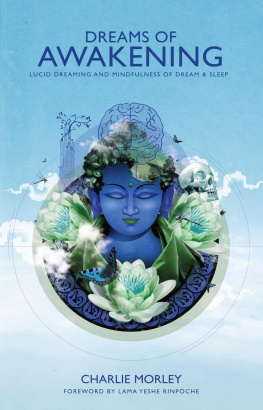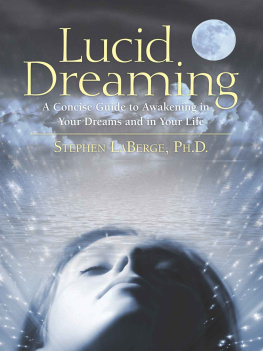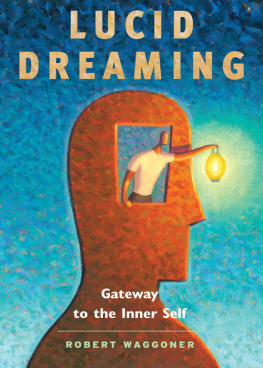Acknowledgments
We cannot say how much we owe to our predecessors; without the efforts of countless others, this work could not have been accomplished. Thanks to them all, known and unknown.
We especially wish to thank all the people who wrote to us about their experiences with lucid dreaming, especially those whose reports we used. It would have been impossible to obtain permissions from everyone, so we have used initials for attributions rather than full names.
Thanks also to Joanne Blokker, Charles Brandon, the Fetzer Institute, Dr. Oscar Janiger, the Monteverde Foundation, and Jonathan Parker of the Institute for Human Development for financial and other support which made this book possible. Drs. William Dement and Phil Zimbardo provided professional encouragement. Our agent, John Brockman, earned his percentage many times over. Laurie Cook, Dorothy LaBerge, Michael LaPointe, K. Romana Machado, and Judith Rheingold all read drafts of the book and made valuable suggestions. Cheryl Woodruffs perspicacious editing did much to make the book more human and intelligible.
Mushkil Gusha made the usual contribution. Finally, we gratefully acknowledge that Lynne Levitan deserves to be a coauthor for all the work she put into the book.
The World of Lucid Dreaming
The Wonders of Lucid Dreaming
I realized I was dreaming. I raised my arms and began to rise (actually, I was being lifted). I rose through black sky that blended to indigo, to deep purple, to lavender, to white, then to very bright light. All the time I was being lifted there was the most beautiful music I have ever heard. It seemed like voices rather than instruments. There are no words to describe the JOY I felt. I was very gently lowered back to earth. I had the feeling that I had come to a turning point in my life and I had chosen the right path. The dream, the joy I experienced, was kind of a reward, or so I felt. It was a long, slow slide back to wakefulness with the music echoing in my ears. The euphoria lasted several days; the memory, forever. (A. F., Bay City, Michigan)
I was standing in a field in an open area when my wife pointed in the direction of the sunset. I looked at it and thought, How odd; Ive never seen colors like that before. Then it dawned on me: I must be dreaming! Never had I experienced such clarity and perception the colors were so beautiful and the sense of freedom so exhilarating that I started racing through this beautiful golden wheat field waving my hands in the air and yelling at the top of my voice, Im dreaming! Im dreaming! Suddenly, I started to lose the dream; it must have been the excitement, I instantly woke up. As it dawned on me what had just happened, I woke my wife and said, I did it, I did it! I was conscious within the dream state and Ill never be the same. Funny, isnt it? How a taste of it can affect one like that. Its the freedom, I guess; we see that we truly are in control of our own universe. (D. W., Elk River, Minnesota)
I am studying to become a professional musician (French horn), and I wished to remove my fear of performing in front of people. On several occasions I placed myself in a state of self hypnosis/daydreaming by relaxing my entire body and mind before going to sleep. Then I focused on my desire to have a dream in which I was performing for a large audience by myself but was not nervous or suffering from any anxiety. On the third night of this experiment, I had a lucid dream in which I was performing a solo recital without accompaniment at Orchestra Hall in Chicago (a place where I have performed once before, but in a full orchestra). I felt no anxiety regarding the audience, and every note that I played made me feel even more confident. I played perfectly a piece that I had heard only once before (and never attempted to play), and the ovation I received added to my confidence. When I woke up, I made a quick note of the dream and the piece that I played. While practicing the next day, I sight-read the piece and
played it nearly perfectly. Two weeks (and a few lucid dream performances) later, I performed Shostakovichs Fifth Symphony with the orchestra. For the first time, nerves did not hamper my playing, and the performance went extremely well. (J. S., Mt. Prospect, Illinois)
Strange, marvelous, and even impossible things regularly happen in dreams, but people usually dont realize that the explanation is that they are dreaming. Usually doesnt mean always and there is a highly significant exception to this generalization. Sometimes, dreamers do correctly realize the explanation for the bizarre happenings they are experiencing, and lucid dreams, like those recounted above, are the result.
Empowered by the knowledge that the world they are experiencing is a creation of their own imagination, lucid dreamers can consciously influence the outcome of their dreams. They can create and transform objects, people, situations, worlds, even themselves. By the standards of the familiar world of physical and social reality, they can do the impossible.
The world of lucid dreams provides a vaster stage than ordinary life for almost anything imaginable, from the frivolous to the sublime. You could, if you chose, revel at a saturnalian festival, soar to the stars, or travel to mysterious lands. You could join those who are testing lucid dreaming as a tool for problem solving, self-healing, and personal growth. Or you could explore the implications of teachings from ancient traditions and reports from modern psychologists that suggest that lucid dreams can help you find your deepest identity who you really are.
Lucid dreaming has been known for centuries, but has until recently remained a rare and little understood phenomenon. My own scientific and personal explorations, together with the findings of other dream researchers around the world, have just begun to shed light on this unusual state of consciousness. Recently, this new research field has captured the attention of the population outside the world of scientific dream research because studies have shown that given proper training, people can learn to have lucid dreams.
But why are people interested in learning to be conscious in their dreams? According to my own experience, and the testimony of thousands of other lucid dreamers, lucid dreams can be extraordinarily vivid, intense, pleasurable, and exhilarating. People frequently consider their lucid dreams as among the most wonderful experiences of their lives.
If this were all there were to it, lucid dreams would be delightful, but ultimately trivial entertainment. However, as many have already discovered, you can use lucid dreaming to improve the quality of your waking life. Thousands of people have written to me at Stanford telling how they are using the knowledge and experience they have acquired in lucid dreams to help them get more out of living.
Although the outlines of a practical art and science of lucid dreaming are just beginning to emerge and the systematic use of lucid dreaming as a tool for psychological self-exploration is still in its infancy, most people can safely use the available knowledge about lucid dreaming to conduct their own explorations. Probably
the only people who should not experiment with lucid dreaming are those who are unable to distinguish between waking reality and constructions of their imagination. Learning lucid dreaming will not cause you to lose touch with the difference between waking and dreaming. On the contrary, lucid dreaming is for becoming more aware.
Why This New Book?
In Lucid Dreaming, I collected the available knowledge on the subject from both ancient and modern sources. Since that books publication, some ten thousand people have written to me describing their experiences and discoveries, and requesting more practical information about lucid dreaming. In response to those requests, I decided to collaborate on a new book with Howard Rheingold. Howard has written extensively on topics such as creativity, consciousness, and dreamwork.

